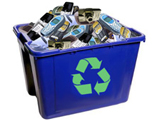Apple and Dell have begun to use the extremely persuasive power of environmental marketing techniques to their advantage. In an effort to lure customers, Apple has claimed that they produce “the world’s greenest family of notebooks.” Dell, a long time supporter of environmentally friendly initiatives and one of Apple’s largest competitors, found this to be a false claim and filed a complaint regarding the truthfulness of the claims made through Apple’s ads and marketing. Yet, Dell did not receive the support they were hoping to receive from the National Advertising Division of the Council of Better Business Bureaus (NAD). NAD ruled:
“The advertiser has specifically undertaken to design all of its MacBooks to reduce their negative environmental impact, as reflected in Electronic Product Environmental Assessment Tool (EPEAT) ratings, and that it should be free to communicate that information to consumers. While other manufacturers may have subcategories of lines with similar ratings, none has comparable high ratings for all of the notebooks it produces.”
NAD further recommended that Apple adjust its tag line in that they:
“make [it] clearer that the basis of comparison is between all MacBooks to all notebooks made by a given competitor, and avoid the reference to ‘world’s greenest’.”
Apple was very pleased with the ruling; the full story is available here. Apple continues their attempts to be mindful of the environment by producing energy efficient products that do not contain chemical components that are hazardous to the environment.
After the ruling, Dell will continue to support movements against the overuse of “green” initiatives and to take a closer look at the usage of environmental marketing techniques. They feel that the market has been completely “greenwashed” and that these practices must stop. They would like to see a specific outline regarding the definition of “green” produced in the near future.
Mirror, mirror, on the wall— who will be the greenest of all?



